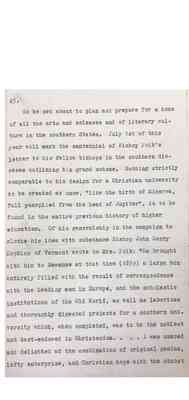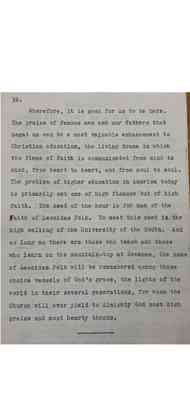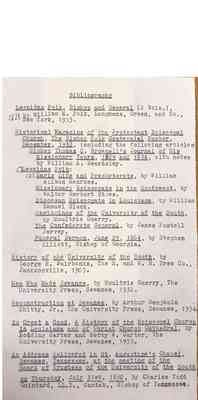Pages That Mention Sewanee
Polk Family Papers Box 1 Document
3
Perhaps the same fair question has occurred to some of you as you have contemplated the circumstances under which you are being addressed this evening -- a Yale alumnus bearing the name of Sherman is invited to speak at the Harvard Club on an occasion honoring a Bishop who was also a Confederate General! While in the last analysis what brought me here is known only to Providence, I wish to go on record as being grateful not only to Providence but also to Mr. John Duncan and to my friend and colleague in the Anglican Society, Mr. James T. Williams, Jr., for this delightful association. I am glad also of this opportunity to state publically that in Long Island we are keenly aware of the high calibre of the contribution which Sewanee has made and is making to our diocesan and community life through the splendid priests who are graduates of her School of Theology and through laymen, leaders in their professions, who proudly bear their degrees from the University of the South.
[] "Let us now praise famous men, and our
5
-4-
famous men the University of the South rightly holds first claim. But Sewanee's title must not be allowed to be exclusive. These men belong also the the Protestant Episcopal Church; they belong to the Anglican Communion; they belong to the One, Holy, Catholic and Apostolic Church of the ages. And at the head of their line we rejoice to recognize that grand triumvirate of Bishops and Fathers in God -- James Hervey Otey of Tennessee, Stephen Elliott of Georgia, and, in their center, Leonidas Polk, Missionary Bishop of Arkansas and the Southwest, first Foreign Missionary Bishop of the Protestant Episcopal Church, first Bishop of Louisiana, and, in the words of Bishop Quintard, "the projector, originator, and real founder of the University of the South."
The life of Leonidas Polk was impressed from the beginning with a military character. Both his father and his grandfather had been soldiers of the Revolution. Born on April 10, 1806, in Raleigh, North Carolina, he received
26
-25-
So he set about to plan and prepare for a home of all the arts and sciences and of literary culture in the southern States. July 1st of this year will mark the centennial of Bishop Polk's letter to his fellow bishops in the southern dioceses outlining his grand scheme. Nothing strictly comparable to his design for a Christian university to be created at once, "like the birth of Minerva, full panoplied from the head of Jupiter", is to be found in the entire previous history of higher education. Of his generalship in the campaign to clothe his idea with substance Bishop John Henry Hopkins of Vermont wrote to Mrs. Polk: "He brought with him to Sewanee at that time (1859) a large box entirely filled with the result of correspondence with the leading men in Europe, and the scholastic institutions of the Old World, as well as laborious and thoroughly digested projects for a southern university which, when completed, was to be the noblest and best-endowed in Christendom.... I was amazed and delighted at the combination of original genius, lofty enterprise, and Christian hope with the utmost
33
-32-
Wherefore, it is good for us to be here. The praise of famous men and our fathers that begat us can be a most valuable enhancement to Christian eduction, the living drama in which the flame of faith is communicated from mind to mind, from heart to heart, and from soul to soul. The problem of higher education in America today is primarily not one of high finance but of high faith. The need of the hour is for men of the faith of Leonidas Polk. To meet this need is the high calling of the University of the South. And as long as there are those who teach and those who learn on the mountain-top at Sewanee, the name of Leonidas Polk will be remembered among those choice vessels of God's grace, the lights of the world in their several generations, for whom the Church will ever yield to Almighty God most high praise and most hearty thanks.
------------------------------------------------------------------------------------------------
34
BIBLIOGRAPHY
Leonidas Polk, Bishop and General (2 Vols.), by William M. Polk, Longmans, Green, and Co., New York, 1915.
Historical Magazine of the Protestant Episcopal Church, The Bishop Polk Centennial Number, December, 1938, including the following article's: Bishop Thomas C. Brownell's Journal of His Missionary Tours, 1829 and 1834, with notes by William A. Beardsley. Leonidas Polk: Early Life and Presbyterate, by William Wilson Manross. Missionary Episcopate in the Southwest, by Walter Herbert Stowe. Diocesan Episcopate in Louisiana, by William Samuel Slack. Beginnings of the University of the South, by Moultrie Guerry. The Confederate General, by James Postell Jervey. Funeral Sermon, June 29, 1864, by Stephen Elliott, Bishop of Georgia.
History of the University of the South, by George R. Fairbanks, The H. and W. B. Drew Co., Jacksonville, 1905.
Man who Made Sewanee, by Moultrie Guerry, The University Press, Sewanee, 1932.
Reconstruction at Sewanee, by Arthur Benjamin Chitty, Jr., The University Press, Sewanee, 1954.
So Great a Good, A History of the Episcopal Church in Louisiana and of Christ Church Cathedral, by Hodding Carter and Betty W. Carter, University Press, Sewanee, 1955.
An Address delivered in St. Augustine's Chapel, Sewanee, Tennessee, at the meeting of the Board of Trustees of the University of the South, on Thursday, July 31st, 1890, by Charles Todd Quintard, LL.D., Cantab., Bishop of Tennessee.




